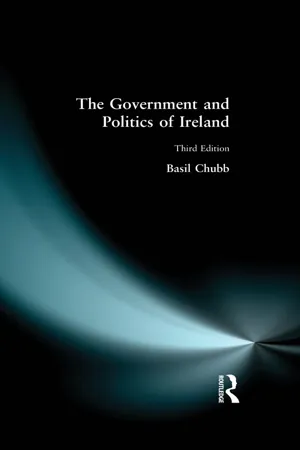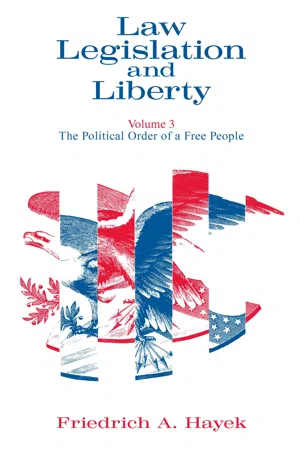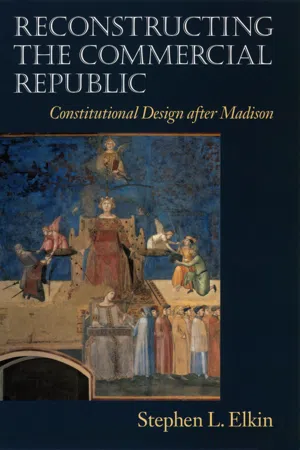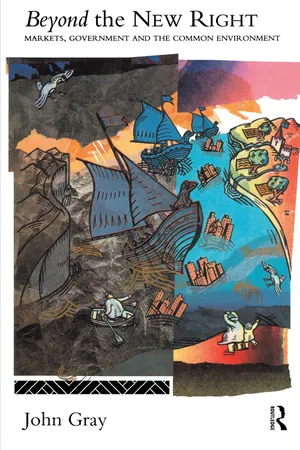Politics & International Relations
Limited Government
Limited government refers to a political system in which the power of the government is restricted by law and a constitution. This concept aims to protect individual liberties and prevent government overreach. It often involves the separation of powers, checks and balances, and the protection of civil rights and freedoms.
Written by Perlego with AI-assistance
Related key terms
4 Key excerpts on "Limited Government"
- eBook - ePub
- Basil Chubb(Author)
- 2014(Publication Date)
- Routledge(Publisher)
Chapter 3 The Framework of Limited Government I The desire to limit the power of public authorities and to define the rights and duties of the citizens is a characteristic feature of the liberal-democratic world. To effect such a limitation involves formulating and formalizing the basic and most important of these powers, rights and duties in rules of law that have special significance and status. Thus, 'the constitution for most countries in the world, is a selection of legal rules which govern the government of that country and which have been embodied in a document'. 1 In Ireland, as in most countries, such a document is regarded as being both the fundamental law of the state and 'a kind of higher law'. 2 It is both an instrument by which public authorities can be controlled and a point of reference in disputes over rights and duties. A constitution thus defined is, however, no more than a selection of rules that define the functions and powers of public authorities, govern the more formal political procedures and relationships and enunciate the basic rights and duties of the citizens. At best, it will define only the general pattern of political and legal organization and relationships. The day-to-day operations of government will make necessary both the creation of a body of law dealing with matters too detailed to include in the constitution and the development of an ever-growing collection of laws or other legal instruments, court rulings, and statements of practice or norms that are not formal rules at all. For lawyers and political scientists this collection, too, is part of 'the constitution' in a second and wider sense of the word. There is merit in this: no selection of rules embodied in a document can be operated in isolation - eBook - ePub
Law, Legislation and Liberty, Volume 3
The Political Order of a Free People
- F. A. Hayek(Author)
- 2011(Publication Date)
- University of Chicago Press(Publisher)
EIGHTEEN THE CONTAINMENT OF POWER AND THE DETHRONEMENT OF POLITICSWe are living at a time when justice has vanished. Our parliaments light-heartedly produce statutes which are contrary to justice. States deal with their subjects arbitrarily without attempting to preserve a sense of justice. Men who fall under the power of another nation find themselves to all intents and purposes outlawed. There is no longer any respect for their natural right to their homeland or their dwelling place or property, their right to earn a living or to sustenance, or to anything whatever. Our trust in justice has been wholly destroyed.Albert Schweitzer*Limited and unlimited powerThe effective limitation of power is the most important problem of social order. Government is indispensable for the formation of such an order only to protect all against coercion and violence from others. But as soon as, to achieve this, government successfully claims the monopoly of coercion and violence, it becomes also the chief threat to individual freedom. To limit this power was the great aim of the founders of constitutional government in the seventeenth and eighteenth centuries. But the endeavour to contain the powers of government was almost inadvertently abandoned when it came to be mistakenly believed that democratic control of the exercise of power provided a sufficient safeguard against its excessive growth.1We have since learnt that the very omnipotence conferred on democratic representative assemblies exposes them to irresistible pressure to use their power for the benefit of special interests, a pressure a majority with unlimited powers cannot resist if it is to remain a majority. This development can be prevented only by depriving the governing majority of the power to grant discriminatory benefits to groups or individuals. This has generally been believed to be impossible in a democracy because it appears to require that another will be placed above that of the elected representatives of a majority. In fact democracy needs even more severe restraints on the discretionary powers government can exercise than other forms of government, because it is much more subject to effective pressure from special interests, perhaps of small numbers, on which its majority depends. - eBook - ePub
Reconstructing the Commercial Republic
Constitutional Design after Madison
- Stephen L. Elkin(Author)
- 2015(Publication Date)
- University of Chicago Press(Publisher)
In short, each major societal group has an interest in seeing that there are some limits on governmental power. And, even though there are collective action problems, the small number of societal actors likely to be involved will allow conventions, written and otherwise, to grow up that will work to prevent such a remaking. These conventions are necessary if constitutional government is to survive, and it is no great leap to argue that they will be valued by large numbers of public officials and leaders of major social interests long after they are first put in place. 53 The fourth force at work in limiting governmental power is competition between political parties. If the above factors are at work and the citizenry has any inclination to limit state power, the question of limits on government will be an issue in the competition between political parties. One of the parties will find it politically advantageous to present itself as speaking for Limited Government. In recent years, this has certainly been true of the Republican party: the Reagan “revolution” and its aftermath can be understood as one long reminder to the nation’s electorate and political elites of the reasons for limits on governmental power. In addition to the above generalized pressures that work to limit governmental authority, a well-ordered republic will also give lawmakers incentives to use political authority to serve specific elements of the public interest. In a republic, limiting public power means using it for the broad purposes delineated in the public interest and by means consistent with its requirements. Again, we can point to forces at work that, with modest reform, will increase the likelihood that the public interest will be served. To illustrate, consider those elements of the public interest concerned with securing a vibrant civil society and a variety of rights - eBook - ePub
- John Gray(Author)
- 2013(Publication Date)
- Routledge(Publisher)
Limited Government A positive agenda Economic Policy for a Free Societynone of the precious ‘freedoms’ which our generation has inherited can be extended, or even maintained, apart from an essential freedom of enterprise – apart from a genuine ‘division of labour’ between competitive and political controls.(Henry Simon)1The proper extent of the activity and authority of government is the chief question in political philosophy. The object of these reflections, nevertheless, is not to try to specify, once and for all, the appropriate functions of government and the limits of its authority. There are good sceptical reasons – which I shall invoke when I consider recent attempts to fix the frontiers of the state by reference to a set of abstract principles – for supposing that that object cannot be achieved. My purpose here is the humbler one of addressing the role of government in Britain today and in other, similar countries. Since I deploy arguments and considerations which ought to be accepted by anyone who cares for individual liberty, my reflections are intended to have application well beyond the present circumstances in Britain, but I harbour no aspiration of universality for them. This is intended to be a study in theory and policy, not primarily in political philosophy.I shall not rehearse my arguments here, but instead simply summarise my conclusions. The scope of government activity in Britain remains vastly overextended. The autonomous institutions of civil society are today threatened by an invasive state whose size and arbitrary power have not substantially diminished, and in important respects have indeed been enhanced, after over a decade of rule by a Conservative administration avowedly dedicated to whittling down government to its most indispensable functions. In recent years, the project of confining government to the task of assuring for individuals and enterprises a stable legal and monetary framework within which they may plan their own activities has been abandoned, and there has been a return to ‘stop-go’ policies of macro-economic management, with government conceiving itself as the sponsor or author of enterprise. According to most measures, the overall burden of taxation has not diminished but rather increased, and public expenditure as a fraction of national income has fallen, if at all, only slightly. It is, again, a depressing fact that, despite efforts to diminish the culture of dependency in Britain, the poorer half of the population still receives nearly half of its income from government. Most ominously, a tendency to increasing centralisation has become evident in many aspects of policy, most particularly in those concerning education, with substantial discretionary powers being appropriated by Ministers. As the Economist noted recently: Tar from reducing the role of the central state, Mrs Margaret Thatcher’s government has extended it…. Mr Kenneth Baker acquired 415 new powers when the Education Reform Act became law in July…. Mrs Thatcher’s government has also broken all records in the quantity of legislation.’2 There has also been an explosion of secondary legislation, with the first half of 1987 seeing as many pages of statutory instruments (allowing for subsequent ministerial orders) as the whole of 1959. Further, as the Economist went on to observe: ‘Over the past two years the civil service has started to grow again. Its numbers are still higher than they were under Mr Edward Heath’s Tory government of the early 1970s…. The numbers working for quangos have also started to rise. Recent and prospective legislation could make things worse. The new education bill has created four big new quangos, covering the national curriculum, school examinations and the financing of universities and polytechnics. The water-privatisation bill will set up an even bigger one, a national rivers authority employing up to 10,000 staff.’3
Index pages curate the most relevant extracts from our library of academic textbooks. They’ve been created using an in-house natural language model (NLM), each adding context and meaning to key research topics.



